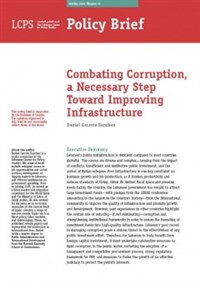Combating Corruption, a Necessary Step Toward Improving Infrastructure

Lebanon's public infrastructure is deficient compared to most countries globally. The causes are diverse and complex—ranging from the impact of conflicts, insufficient and ineffective public investment, and the arrival of Syrian refugees. Poor infrastructure is one key constraint on business growth and job production, as it hinders productivity and reduces standards of living. Given its limited fiscal space and pressing needs facing the country, the Lebanese government has sought to attract large investment funds—with pledges from the CEDRE conference amounting to the largest in the country’s history—from the international community to improve the quality of infrastructure and promote growth and development. However, past experiences in other countries highlight the central role of reducing—if not eliminating—corruption and strengthening institutional frameworks in order to ensure the funneling of investment funds into high-quality infrastructure. Lebanon's poor record in managing corruption poses a serious threat to the effectiveness of any public investment effort. Therefore, for Lebanon to truly benefit from foreign capital investment, it must undertake substantive measures to fight corruption in the public sector, including the adoption of a transparent and competitive procurement process, strong regulatory framework for PPP, and measures to foster the growth of an effective judiciary to protect the public’s interests.
Daniel Garrote Sánchez
contributed to this project while being a senior researcher
at the Lebanese Center for Policy Studies. He currently works as a labor market
consultant at the World Bank. His areas of work include economic migration,
labor markets and the task content of jobs, conflict and forced displacement,
and development of lagging regions. Prior to joining LCPS, he served as a
labor migration consultant for the World Bank and the Ministry of Labor of
Saudi Arabia. He also worked for six years as an economic researcher at the
Central Bank of Spain covering a range of macroeconomic topics such as fiscal
policy, labor markets, and deleveraging. Garrote Sánchez holds a master’s
degree in Public Administration and International Development from the
Harvard Kennedy School of Government.
 Lebanon's public infrastructure is deficient compared to most countries globally. The causes are diverse and complex—ranging from the impact of conflicts, insufficient and ineffective public investment, and the arrival of Syrian refugees. Poor infrastructure is one key constraint on business growth and job production, as it hinders productivity and reduces standards of living. Given its limited fiscal space and pressing needs facing the country, the Lebanese government has sought to attract large investment funds—with pledges from the CEDRE conference amounting to the largest in the country’s history—from the international community to improve the quality of infrastructure and promote growth and development. However, past experiences in other countries highlight the central role of reducing—if not eliminating—corruption and strengthening institutional frameworks in order to ensure the funneling of investment funds into high-quality infrastructure. Lebanon's poor record in managing corruption poses a serious threat to the effectiveness of any public investment effort. Therefore, for Lebanon to truly benefit from foreign capital investment, it must undertake substantive measures to fight corruption in the public sector, including the adoption of a transparent and competitive procurement process, strong regulatory framework for PPP, and measures to foster the growth of an effective judiciary to protect the public’s interests.Daniel Garrote Sánchez contributed to this project while being a senior researcher at the Lebanese Center for Policy Studies. He currently works as a labor market consultant at the World Bank. His areas of work include economic migration, labor markets and the task content of jobs, conflict and forced displacement, and development of lagging regions. Prior to joining LCPS, he served as a labor migration consultant for the World Bank and the Ministry of Labor of Saudi Arabia. He also worked for six years as an economic researcher at the Central Bank of Spain covering a range of macroeconomic topics such as fiscal policy, labor markets, and deleveraging. Garrote Sánchez holds a master’s degree in Public Administration and International Development from the Harvard Kennedy School of Government.
Lebanon's public infrastructure is deficient compared to most countries globally. The causes are diverse and complex—ranging from the impact of conflicts, insufficient and ineffective public investment, and the arrival of Syrian refugees. Poor infrastructure is one key constraint on business growth and job production, as it hinders productivity and reduces standards of living. Given its limited fiscal space and pressing needs facing the country, the Lebanese government has sought to attract large investment funds—with pledges from the CEDRE conference amounting to the largest in the country’s history—from the international community to improve the quality of infrastructure and promote growth and development. However, past experiences in other countries highlight the central role of reducing—if not eliminating—corruption and strengthening institutional frameworks in order to ensure the funneling of investment funds into high-quality infrastructure. Lebanon's poor record in managing corruption poses a serious threat to the effectiveness of any public investment effort. Therefore, for Lebanon to truly benefit from foreign capital investment, it must undertake substantive measures to fight corruption in the public sector, including the adoption of a transparent and competitive procurement process, strong regulatory framework for PPP, and measures to foster the growth of an effective judiciary to protect the public’s interests.Daniel Garrote Sánchez contributed to this project while being a senior researcher at the Lebanese Center for Policy Studies. He currently works as a labor market consultant at the World Bank. His areas of work include economic migration, labor markets and the task content of jobs, conflict and forced displacement, and development of lagging regions. Prior to joining LCPS, he served as a labor migration consultant for the World Bank and the Ministry of Labor of Saudi Arabia. He also worked for six years as an economic researcher at the Central Bank of Spain covering a range of macroeconomic topics such as fiscal policy, labor markets, and deleveraging. Garrote Sánchez holds a master’s degree in Public Administration and International Development from the Harvard Kennedy School of Government.